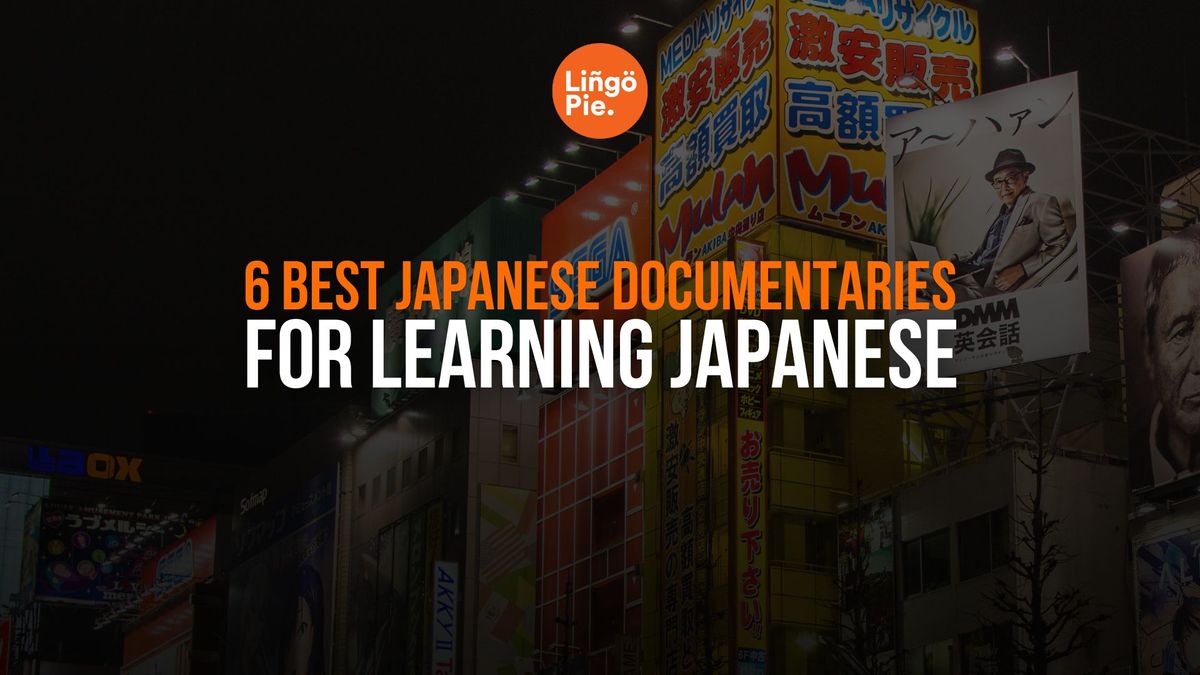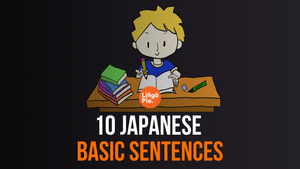You know how everyone's obsessed with Alice in Borderland right now? Yeah, me too. I spent last weekend binging it (again), and it got me thinking about something weird - why aren't more people talking about Japanese documentaries? I mean, we're all here falling in love with Japanese storytelling through these slick Netflix shows, but there's this whole other world of incredible (and educational!) Japanese content.
If you're ready to discover some incredible documentaries AND learn Japanese, I've got six films that will transform your language-learning journey. Each one is packed with natural conversations, regional dialects, and cultural insights that'll improve your Japanese in ways textbooks never could.
- 10 Japanese Basic Sentence Patterns Every Learner Should Know
- Pokémon names and their meanings in Japanese
- 6 Books and Textbooks to Learn Japanese

Best Japanese Documentaries
The ones we're covering below are all available on Lingopie with interactive subtitles and learning tools. Each one is guaranteed to give learners insights into Japanese culture while helping them improve their language skills naturally.
Magical Punchline

Magical Punchline takes viewers behind the glittering curtain of Japan's idol industry. Far from the polished performances on stage, this raw documentary captures the sweat, tears, and unfiltered conversations during grueling practice sessions, private moments in dressing rooms, and candid interviews where members share their personal struggles with the demanding idol lifestyle.
This Japanese documentary is a must-watch because you'll learn casual speech patterns used between group members, formal Japanese during interviews, and even the specific lingo used in dance rehearsals. You'll also get to expand your Japanese vocab with slang words that are actually used today.
Rena Ganaha

Ever wondered what it's like to talk to spirits? This documentary follows Rena Ganaha, whose childhood gift of seeing the unseen has turned into something pretty remarkable. Do note though that it's less about spooky ghost hunting and more about how Rena uses her abilities to help people find peace.
The really cool thing about this documentary is how it captures different layers of the language. You'll hear everything from the super-polite Japanese used during formal readings to the gentle, comforting words Rena uses when someone's crying their eyes out. And since it deals with spirits and traditional beliefs, you'll pick up tons of Buddhist and Shinto terms and untranslatable Japanese words that most textbooks don't even mention.
Sabaekoki

Deep in Fukui Prefecture, the city of Sabae holds a fascinating title: Japan's eyewear manufacturing capital. The Sabaekoki documentary basically pulls back the curtain on this specialized industry and captures the pride and precision of local artisans.
Since many interviews feature local residents, you'll get exposed to the distinct Fukui dialect, giving you a taste of how Japanese varies outside of Tokyo. The natural mix of casual shop talk, travel phrases, and formal business language makes this perfect for intermediate learners looking to understand how Japanese is actually used in professional settings.
Eight

This Japanese documentary follows a young couple who built their relationship alongside their restaurant, showing how the chaos and joy of running "Eight" became the foundation for their growing family. What makes this so special is how the cameras capture those tiny moments between dinner rushes, when plans for both the menu and their future take shape over late-night prep work.
For Japanese learners, this documentary is a beautiful mix of casual couple-talk and professional kitchen Japanese. You'll catch real conversations between husband and wife (perfect for learning natural relationship language), professional chef lingo during service, and even cute Japanese words for parent-child interactions as their family grows.
Momoko Yamashita

This candid Japanese documentary follows this dedicated midwife as she creates safe spaces for new moms to share their raw, unfiltered experiences - from midnight feeding struggles to the overwhelming joy of first smiles.
Honestly, our team thinks this is the best because it's particularly valuable for Japanese learners who want to understand how care and emotion are expressed in Japanese culture. You can expect to train your ears with natural conversations about health and childcare, picking up essential medical terminology alongside the gentle, nurturing language used with new mothers.
I Will Be Leaving Now

I Will Be Leaving Now captures those bittersweet final weeks when "my place" becomes "our place." Following a couple on the edge of married life, this documentary gets up close with those little moments you rarely see.
This is a must-watch for Japanese learners because it features a lot of relationship-related Japanese words and expressions. Every scene nails those tricky shifts between casual Japanese with your partner, cute nicknames, and polite Japanese with future in-laws - something textbooks struggle to teach.
How To Learn Japanese Through Documentaries
Forget textbook Japanese - here's how to actually learn from documentaries without making it feel like homework. I've tested these strategies with hundreds of language learners, and they work.
The Vocabulary Building
Method Instead of just watching passively, use Lingopie's interactive subtitles to build your vocabulary. Click on words you don't know for instant translations, and the platform automatically saves them to your personal dictionary. After a while, you'll start recognizing these words in different contexts - that's when you know they're sticking.
Active Listening
Practice Start with shorter segments (2-3 minutes) and challenge yourself to listen closely before checking translations. When you hear a word or phrase you recognize, use Lingopie's repeat feature to play it again. This active listening helps train your ear to catch natural speech patterns and local accents.
Dialogue Study
Lingopie shows you both Japanese and English subtitles simultaneously, making it perfect for studying real conversations. Pay attention to how people respond to each other - you'll pick up natural transition phrases, polite expressions, and casual speech patterns that textbooks rarely teach.
Immersion Sessions
Set aside time for pure Japanese immersion. Watch without English subtitles first, then replay with dual subtitles to check your understanding. Lingopie's clean interface makes it easy to switch between subtitle modes, so you can gradually reduce your reliance on translations.
Remember - consistency beats intensity. Even 15 minutes a day with these techniques will improve your Japanese dramatically over time. Lingopie tracks your watching history, so you can easily maintain a regular study routine without losing your place.

Basic Japanese Words To Learn Before Watching
Just as you'd pack a snack for a movie marathon, let's get you equipped with some essential Japanese words that'll pop up across these documentaries. Think of this as your basic toolkit - words that'll help you follow along even when the subtitles get a bit fuzzy. I've picked out the most common terms you'll hear, focusing on words that tend to come up in documentary-style interviews and narratives.
| Japanese | Pronunciation | English | Example Context |
|---|---|---|---|
| そうですね | sou desu ne | I see/That's right | Often used when agreeing during interviews |
| 頑張る | ganbaru | to do one's best | Used when discussing challenges |
| 気持ち | kimochi | feelings/emotion | Common in personal stories |
| すごい | sugoi | amazing | Frequently used to express admiration |
| なるほど | naruhodo | I understand | Often used by interviewers |
| やはり/やっぱり | yahari/yappari | as expected | Used when confirming thoughts |
| 夢 | yume | dream | Common when discussing aspirations |
| 始める | hajimeru | to start | Used when describing new ventures |
| 経験 | keiken | experience | Often in professional contexts |
| 大切 | taisetsu | important | Used when discussing values |
| 思い出 | omoide | memory | Common in reflective moments |
| 仕事 | shigoto | work/job | Frequent in workplace scenes |
| 家族 | kazoku | family | Essential for family documentaries |
| 変わる | kawaru | to change | Used when discussing transformation |
| 頑張って | ganbatte | good luck/do your best | Common encouragement phrase |
| 伝統 | dentou | tradition | Important for cultural contexts |
| 素晴らしい | subarashii | wonderful | Used to express appreciation |
| 日々 | hibi | daily/everyday | Common in life documentaries |
| 将来 | shourai | future | Used when discussing plans |
| 感謝 | kansha | gratitude | Often in emotional moments |
- 18 Best Japanese Tongue Twisters For Better Pronunciation
- How To Say Good Luck In Japanese [12+ Easy Ways]
- Cheers in Japanese: A Simple Guide to Japan's Drinking Culture
Learn Through Japanese Documentaries With Lingopie
Look, I get it - clicking play on a documentary might not give you the same instant thrill as firing up the latest Japanese drama. But trust me, there's something special about watching real people share their stories in their native language.
Our advice? Start with the Japanese documentary that caught your eye, use those learning techniques we talked about, and watch your Japanese transform in ways textbooks could never match. Your next level of Japanese fluency might just be one documentary away.
FAQ About Japanese Documentaries
Q: Are Japanese documentaries good for learning Japanese?
A: Yes, Japanese documentaries are excellent for language learning. They feature natural speech patterns, real-world conversations, and authentic cultural contexts. Unlike scripted shows, documentaries expose you to various speaking styles, regional dialects, and specialized vocabulary used in everyday situations. With Lingopie's interactive subtitles, you can easily follow along while building your vocabulary.
Q: What level of Japanese do I need to watch Japanese documentaries?
A: You can start watching Japanese documentaries at any level. Beginners can use English subtitles to follow the story while getting used to natural Japanese sounds and basic vocabulary. Intermediate learners can benefit from Japanese subtitles to connect spoken and written language. Advanced learners can focus on picking up nuanced expressions and cultural context.
Q: Which Japanese documentary should I watch first for language learning?
A: For beginners, "Eight" is an ideal first documentary as it features clear, everyday conversations in a restaurant setting. The mix of casual family talk and business Japanese makes it easy to follow while providing practical vocabulary. Plus, the storytelling is engaging enough to keep you motivated through multiple viewings.
Q: How long should I watch Japanese documentaries to improve my language skills?
A: Consistent, shorter sessions are more effective than long marathons. Aim for 15-20 minutes daily rather than several hours once a week. Using Lingopie's progress tracking, you can maintain a regular viewing schedule and review saved vocabulary between sessions for optimal learning.
Q: Can watching Japanese documentaries help with JLPT preparation?
A: Absolutely. Japanese documentaries expose you to authentic language use and natural speech patterns tested in JLPT listening sections. They're particularly helpful for N3-N1 levels where understanding various speaking styles and cultural context is crucial. The real-world vocabulary and grammar patterns you'll encounter complement traditional JLPT study materials.





![Is Dutch Hard to Learn? A Complete Beginner's Guide [2025]](/blog/content/images/size/w1200/2025/01/Is-Dutch-Hard-to-Learn.jpg)



